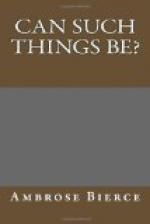It was many days before Haita saw the maiden again. One day he was returning from the head of the valley, where he had gone with ewe’s milk and oat cake and berries for the holy hermit, who was too old and feeble to provide himself with food.
“Poor old man!” he said aloud, as he trudged along homeward. “I will return to-morrow and bear him on my back to my own dwelling, where I can care for him. Doubtless it is for this that Hastur has reared me all these many years, and gives me health and strength.”
As he spoke, the maiden, clad in glittering garments, met him in the path with a smile that took away his breath.
“I am come again,” she said, “to dwell with thee if thou wilt now have me, for none else will. Thou mayest have learned wisdom, and art willing to take me as I am, nor care to know.”
Haita threw himself at her feet. “Beautiful being,” he cried, “if thou wilt but deign to accept all the devotion of my heart and soul— after Hastur be served—it is thine forever. But, alas! thou art capricious and wayward. Before to-morrow’s sun I may lose thee again. Promise, I beseech thee, that however in my ignorance I may offend, thou wilt forgive and remain always with me.”
Scarcely had he finished speaking when a troop of bears came out of the hills, racing toward him with crimson mouths and fiery eyes. The maiden again vanished, and he turned and fled for his life. Nor did he stop until he was in the cot of the holy hermit, whence he had set out. Hastily barring the door against the bears he cast himself upon the ground and wept.
“My son,” said the hermit from his couch of straw, freshly gathered that morning by Haita’s hands, “it is not like thee to weep for bears—tell me what sorrow hath befallen thee, that age may minister to the hurts of youth with such balms as it hath of its wisdom.”
Haita told him all: how thrice he had met the radiant maid, and thrice she had left him forlorn. He related minutely all that had passed between them, omitting no word of what had been said.
When he had ended, the holy hermit was a moment silent, then said: “My son, I have attended to thy story, and I know the maiden. I have myself seen her, as have many. Know, then, that her name, which she would not even permit thee to inquire, is Happiness. Thou saidst the truth to her, that she is capricious for she imposeth conditions that man cannot fulfill, and delinquency is punished by desertion. She cometh only when unsought, and will not be questioned. One manifestation of curiosity, one sign of doubt, one expression of misgiving, and she is away! How long didst thou have her at any time before she fled?”
“Only a single instant,” answered Haita, blushing with shame at the confession. “Each time I drove her away in one moment.”
“Unfortunate youth!” said the holy hermit, “but for thine indiscretion thou mightst have had her for two.”




